Penn Glee Club performs in Tokyo, Hong Kong, and Beijing
This story was originally published on June 23rd 2025 in Penn Today.
Writer: Louisa Shepard
The Penn Glee Club performed at the famous Suntory Hall in Tokyo, an art gallery in Hong Kong, and the U.S. embassy in Beijing during a 12-day tour of Asia. Forty members went on the tour, including 25 singers, eight band members, and seven technical crew.
The Penn Glee Club sang the traditional “Red and Blue” at Commencement on Franklin Field and then headed to the airport, arriving in Tokyo to sing that same song and many others at the famous Suntory Hall.
“We even managed to teach everyone the arm wave. Some of the Penn alums in the audience were able to help,” says Sam Scheibe, who is completing his first year as director. “Getting off the plane and then going and performing in Suntory Hall was such an amazing feeling, to realize that we had come so far. Our whole year seemed to culminate at that moment.”
Tokyo was the first stop in a 12-day tour that also took a group of 25 singers, eight band members, and seven technical crew to perform at an art gallery in Hong Kong and the United States embassy in Beijing to perform. They also experienced the cultures in each country, such as taking a bullet train to Kyoto in Japan, hiking the Hong Kong Trail, and walking along the Great Wall of China.
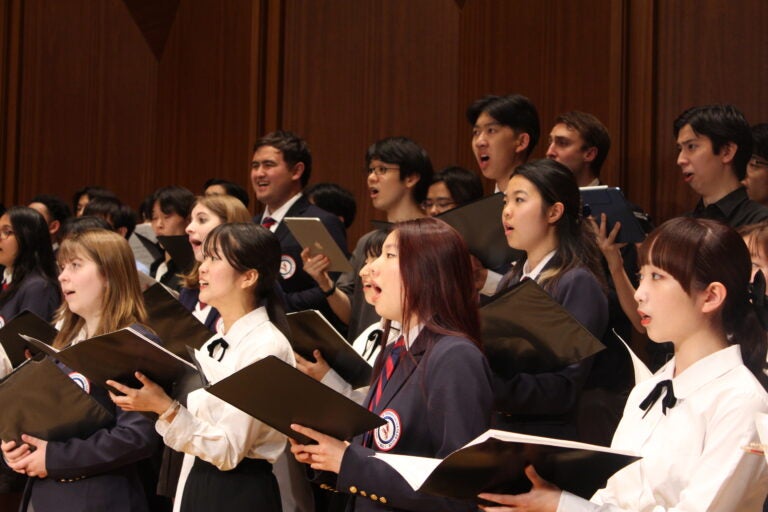
The Glee Club, which typically does an international tour every other year, last traveled to Asia in 2019, before becoming fully gender inclusive in 2021 after 159 years of only male singers. Rising fourth-year Hailey Tobin planned the tour, working closely with alumni to make connections and trip decisions.
“It was really amazing to be able to perform and see how engaged the Penn alumni were in Asia,” says Julia Gauffreau, a rising fourth-year and the incoming Club president. Gauffreau, from Media, Pennsylvania, is in the Vagelos Program in the Molecular Life Sciences in the College of Arts & Sciences, studying biophysics, biochemistry, and chemistry.
A cross-cultural collaboration
The Tokyo performance was a collaboration with the Wagner Society Choirs of Japan’s Keio University. They previously collaborated in 2019 with their all-male choirs. “This year was incredibly special because we had the full range of voices,” says Kyne Wang, outgoing Glee Club president, who graduated in May from the Vagelos Life Sciences and Management Program, a dual-degree program in the School of Arts & Sciences and the Wharton School. “It was a dream come true to be able to perform on this tour.”
Each of the choirs did a 50-minute set before singing one piece together, “If Music Be the Food of Love” by David Dickau. “It was a really powerful experience to have the singers from both groups perform together,” Scheibe says.
My parents were immigrants, and I’m the first in my family to graduate college — but I won’t be the last
A daughter of Peruvian emigres and a first-generation student who graduated Penn last week offers a simple message to other Latin members of the Class of 2025: Never give up.
Dancing saved me.
In salsa, I found joy, healing, and freedom. In the loneliest days when I first came to the University of Pennsylvania — the oldest daughter of two immigrant parents and the first to attend college — it was in dance where I rediscovered myself, where I felt free, where I knew — I was meant to be here.
Like so many other students of Latin American descent, my graduation is the culmination of a long journey. My parents left everything behind in Perú — their home, sus familias, their language, their roots — all for the hope of something better. Not just for themselves, but for the generations to come.
And that sacrifice … I will never forget. In my darkest moments, when I felt like giving up, when I was too tired to keep going, I thought of them.
Of their strength. Of their courage. Of their love.
And it reminded me: that strength also lives in me.
I am a first-generation, low-income college student. La primera de mi familia en graduarse de la universidad. But I know I won’t be the last. Because behind me a whole generation of dreamers, fighters, and leaders is coming.
I come from Paterson, N.J. — a city with many difficulties, but also with a lot of life, a lot of culture, and a lot of dignity. The kind of place people overlook. But it built me.
To think that someone like me could make it from there to here — to the University of Pennsylvania, an Ivy league institution — still feels surreal.

The Class of 2025 made it here against all odds.
We graduated from high school during a pandemic — a time filled with fear, uncertainty, and pain. The world was dark. But we kept going. And now, we’re graduating into another kind of darkness.
A world that questions our worth. With policies that make us feel like we don’t belong.
A country where immigrant communities are under attack.
But let me tell you something:
We are still here. We are graduating. And that is resilience.
This diploma is more than a piece of paper.
It’s tangible evidence of every sleepless night.
Of every hidden tear.
Of every sacrifice made for our families.
Of every time we felt we couldn’t, but did it anyway.
At Penn, I’ve had the privilege to wear many hats and take part in many student organizations post-pandemic.
But let me be real with you.
There were moments I wanted to quit. Moments where I questioned my worth, my character, my light.
But even then … I kept going. Because I know who I am. I poured love, grace, and dedication into everything I touched. Because my parents didn’t raise me to be small. Because they didn’t raise me to quit. They raised me to believe in myself. In my character. In my dignity. In my resilient Latin nature. And despite the hatred, I kept going.
And to those who tried to turn off my light … here I am. Shining brighter than ever.
Because the struggle, el amor, and the faith that brought me here — they don’t fade. They just grow.
But I could not have done this without all of the people who stayed and loved me when I couldn’t love myself. To those who listened when I couldn’t speak. To those who reminded me I was never truly alone.
Class of 2025 — we did this. We are the first class to fully experience college life post-pandemic. We brought life back to this campus. We filled the gap that was left to make sure our Latino community was still present. We brought back organizations, started new ones, and created community in places that weren’t made for us. We carried the legacies left behind and built our own.
And no matter what the world tries to tell us — we know our worth. So as we step into this next chapter, I want to leave you with this:
Be bold. Be you. Confía en ti. This world needs people like us — who love hard, who work harder, who know struggle, but never give up.
Use this education — this privilege — to make change. To open doors for others. To build the world our parents dreamed of when they crossed borders and oceans.
To our parents: This achievement is as much yours as it is ours. Thank you for sacrificing, for enduring, for never giving up.
Thank you for teaching us to dream.
Thank you for loving us beyond belief.
They tried to make us feel like we didn’t belong. But here we are. Graduating. Fighting. Living.
And dancing, too.
Sandra María Navarro Davalos graduated magna cum laude from the University of Pennsylvania last week with a bachelor of arts in communication concentrating in advocacy & activism, with minors in fine arts and Latinx & Latin American Studies. A native of Paterson, N.J., she is enrolled in the master’s program at Penn’s School of Social Policy and Practice. This essay is adapted from her remarks at Penn’s Latinx graduation ceremony.
Penn Career Services podcast recognized nationally as a Top 10 Best Career Podcast for Students
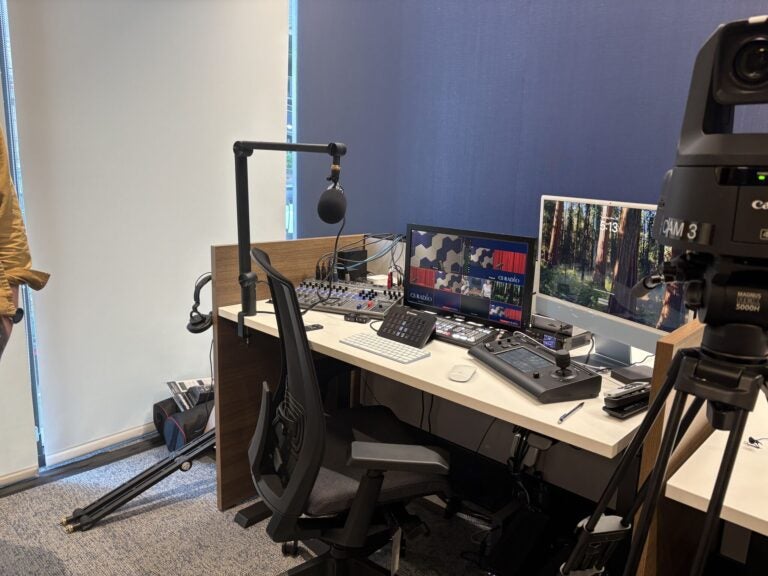
The University of Pennsylvania’s CS Radio podcast has been recognized nationally by Million Podcasts, earning a place on three of the outlet’s 2025 “Best Of” lists. The show ranked among the Top 10 Best Career Podcasts for Students, the Top 25 Best University Podcasts, and the Top 100 Best Career Exploration Podcasts overall — highlighting its growing influence as a trusted resource for students navigating the world of work.
Hosted by Michael DeAngelis and Natty Leach from Penn’s Career Services office, CS Radio offers listeners a weekly dose of career advice, professional development insights, and practical tips delivered with wit and expertise. Since its launch, the podcast has aimed to demystify the career process and provide support for students at every stage of their journey, from choosing a major to landing a first job or internship.
With more than ten seasons under their belt, DeAngelis and Leach have built a dedicated audience that extends far beyond campus. Their recent recognition is a testament to the podcast’s consistency, relevance, and genuine connection with student listeners. As higher education increasingly turns to digital platforms to engage and inform, CS Radio stands out as a model of how universities can meet students where they are.
The recognition comes at an exciting moment for the team, as Penn’s Career Services recently launched a new media studio — opening the door to even more innovative content creation. With a national spotlight now shining brighter than ever, CS Radio is well-positioned to continue evolving as a leading voice in the student career space.
Performer, biomedical engineer, and soon-to-be graduate
This story was originally published on May 13th 2025 in Penn Today.
Writer: Louisa Shepard
Photographer: Eric Sucar; Scott Spitzer
Graduating fourth-year Jordyn Harris is pursuing a career in engineering and medicine while also dedicating herself to the performing arts.
Mixing it up is what graduating fourth-year Jordyn Harris likes best.
At Penn she has been an applied science in biomedical sciences major while also pursuing a major in gender, sexuality, and women’s studies, and she has had a work-study job in performing arts and another job as a researcher at a hospital. Harris has also been on stage as a dancer and behind the scenes running tech for student shows while also volunteering as an adviser and mentor for engineering students and a member of a performing arts senior society, as well as a sorority for women in science, technology, engineering and mathematics (STEM).
“I’m a STEM girl who does performing arts; I like the mix,” Harris says. “I’m always doing something. But I love doing all of the things that I do.”
From Baltimore, Harris will graduate this month with a bachelor’s degree of applied science in biomedical sciences from the School of Engineering and Applied Sciences with a second major in gender, sexuality, and women’s studies from the College of Arts and Sciences.
“I’m doing a little bit of everything, and that’s what I think I’ll do with my career generally,” she says. “I want to dive into STEM and medicine but also performing arts as an outlet for my creative side, being in both, and having them interweave with volunteering.”
Harris helped other students as a volunteer orientation peer advisor and an advisor through the Advanced Women of Women in Engineering Preorientation program.
“The thing that is always surprising about Jordyn is how dedicated she is in terms of what she commits to. There’s a sense of responsibility that she has with every role that she’s taken on,” says Sonya Gwak, who until recently was director of student life and undergraduate education, but now is director of global academic programs at Penn Engineering.
“Jordyn’s information has always been reliable because she’ll do her homework and make sure that what she says is accurate. People can depend on her,” Gwak says, including making sure every first-year student is registered for classes. “Because it’s completely voluntary and it because it is a huge undertaking, having somebody like Jordyn in that role is invaluable.”
Harris encouraged engineering students to do performing arts and clubs and other creative pursuits even if that wasn’t what they planned for their careers. “Finding what makes you you, and doing those things in the midst of your career, in the midst of your academics, is key,” she says.
Performing Arts
Since her first year at Penn, Harris has been a work-study student at the Platt Student Performing Arts House helping to manage programming, as well as scheduling rehearsals and performances for student groups. Her interest in performing arts began with ballet when she was about 4 years old. She continued through high school where she played the violin and piano and also dove into theater arts, on stage and behind the scenes.
“If you don’t directly ask her or see her doing good things on campus, you won’t know because she is very humble,” says Laurie McCall, director of the Platt House, noting the many leadership roles Harris has taken on, including mentoring new students as they navigate their performing arts experience.
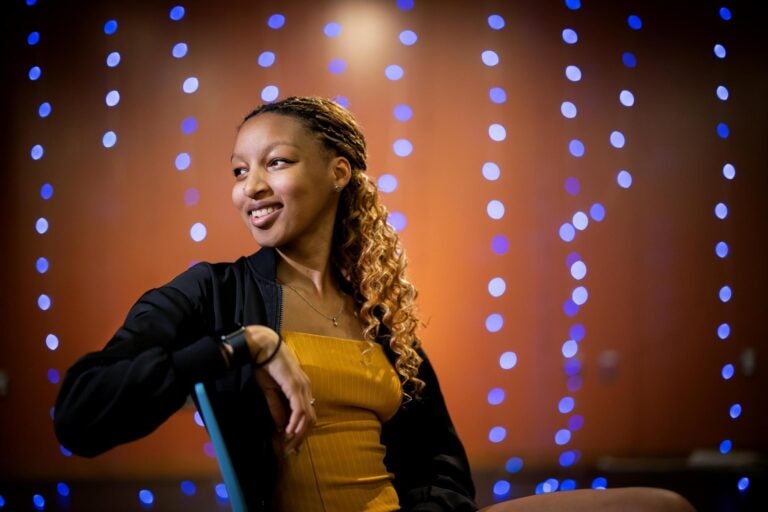
Harris won the Platt House Impact Award that goes “to a student who goes above and beyond the scope of their campus responsibilities” to represent student performing arts “through continual service, model leadership, and general goodwill,” McCall says. “She is a joy to have in our circle.”
Since Harris’s second year at Penn she has been behind the scenes for many student performing arts productions, including iNtuitions Experimental Theater and several Theater Arts Council shows.
“I’ve done pretty much all sides of tech: lights, sound, stage managing both theater and dance,” she says. “I’m also producing, making sure everything is managed the way it should be, things are getting done, all the deadlines are met.”
Her third year she joined Onda Latina as a dancer and usually performs salsa but also mambo fusion, hip-hop, and bachata, working with student choreographers.
STEM
While involved in high school theater, she also was taking all the advanced placement science classes. “Growing up I always wanted to be an engineer,” inspired by her father, she says. “I think that sparked me; I’ve always been good at math, so engineering was my way to go.”
She decided she also wanted to study medicine. Harris chose Penn, she says, because of the bioengineering program and the opportunities to volunteer at hospitals.
Harris completed pre-med requisites, including biology, organic chemistry, biochemistry, chemistry, and physics. She also chose bioengineering design courses, learning how to design medical devices. In one class she worked with doctors at the Perelman School of Medicine “learning about the different devices that they’ve created and learning how to build devices around patients.”
She completed most of her bioengineering classes in her first two years and then took gender studies courses in her third and fourth years. “I really like the breadth of gender studies at Penn because every class is different. I learn something new with all of them,” she says.
“I want to be able to apply those into engineering, into medicine: how different cultures, different races, have been influenced throughout history,” she says. “Especially in the medical field, coming at it from both an engineering STEM and a gender studies perspective.”
For nearly a year Harris has been a paid undergraduate student researcher at the Children’s Hospital of Philadelphia (CHOP) working with Jalaj Maheshwari in the Center for Injury Research and Prevention. The prior two years she was an undergraduate student researcher with Michelle Johnson in the Rehabilitation Robotics Lab at the medical school.
Harris’s thesis for her applied science degree incorporates the work she has been doing at CHOP, which involves running computerized car crash test simulations on child car seats, testing parameters and dimensions of the seats to minimize child injuries in crashes. A subproject of hers is developing a program that manufacturers can use in building the car seats, and to make recommendations to parents to maximize safety.
Penn Alumni recently awarded Harris the 2025 Association of Latino Alumni Student Leadership Award from the James Brister Society.
Looking Ahead
This summer, Harris will be continuing her research at CHOP, with goals of publishing a paper and presenting at conferences. She then is planning to take two gap years, to explore abroad, work, volunteer in hospitals and in theater, and apply to medical schools. She is leaning towards a career in orthopedics. “I’m interested in robotics and prosthetics,” she says.
Gwak says Harris will be greatly missed when she graduates since she has been “a constant part of the community” with a “quiet leadership” that “exemplifies building relationships.” At Penn for 32 years, Gwak says Harris is “one of those people that you remember forever. Once you interact with Jordyn, it’s hard to forget her.”
Graduation will be “a bittersweet moment” and no longer being in school is going to be an adjustment, Harris says. “But I’m excited for what the future holds,” she says, adding that she will return to campus to see the student shows. “I’m going to be that alum who comes back.”
Class of 2026 prepares for ‘iconic’ year during annual Hey Day
This story was originally published on May 1st 2025 in Penn Today.
Writer: Jimmy O’Hara
Photographer: Eric Sucar; Scott Spitzer
Marking a 109-year-old tradition, Penn third-year students united to celebrate their rise to fourth-year status.
An ecstatic crowd of third-year students donning red T-shirts, bamboo canes, and mock skimmer hats electrified Penn’s campus on Thursday, May 1, to mark the University’s 109th Hey Day, a yearly tradition—dating back to 1916—that unifies Penn students across space and time. Clear blue skies and warm weather made for a lively mid-morning picnic at High Rise Field by Rodin College House, with hundreds of third-year students gathered to socialize, reconnect, and celebrate their collective transition to fourth-year rank.
As noon approached, the Class of 2026 marched in a grand procession down Locust Walk led by the Penn Band, crossing the Class of 1949 Bridge and parading under a tall balloon arch toward College Green. There, they were greeted first by Vice Provost for University Life Karu Kozuma and then by President J. Larry Jameson. Per tradition, Jameson lightheartedly tested the class with a three-question, pass-fail “exam,” with their correct responses ascending the students to fourth-year status.
“On behalf of the senior class right now, we wish you the best of luck next year,” said 2025 class president Amaan Omer, nodding to his fellow graduating class, which convened on the opposite site of College Green to celebrate the Final Toast. Omer then passed the symbolic fourth-year class gavel to Vedika Jawa, president of the 2026 cohort. “2026 seniors, can I hear you scream?” shouted Jawa to a crowd of her peers erupting with joyful cheer.
“What a special class, and what a special day. Time has flown by—and now, we have one more year,” continued Jawa. “This is our time to leave our legacy at Penn and make the most of every moment. Get ready, because our senior year is going to be iconic.”
As the Penn Band played “The Red and Blue,” some newly-minted fourth-years joined in song before posing for group photos and selfies and signing skimmer hats with Sharpies.
Luiza Louback, an English major in the College of Arts and Sciences from Brazil, marked the occasion alongside her friend, James Vu, an English and sociology major in the College from New Jersey, and her partner, Richard Macedo, a computer science major in the School of Engineering and Applied Science also from Brazil.
“Hey Day, for me, is just a day to celebrate how far we’ve come,” said Louback, noting how special it felt to see her class reunited as one. “I also love the walk, seeing everybody walking together, all the juniors connecting.”
Vu, who befriended Louback through an English study abroad program in London, shared that Hey Day means “continuing tradition,” calling the annual event a “rite of passage.”
Macedo and Louback met during New Student Orientation on their first day of classes at Penn, bonding in part over their shared Brazilian nationality. Three years later, they would spend Hey Day together, commemorating their time at Penn as part of a broader tapestry of tradition.
“Hey Day really is a way for you to include yourself in the Penn community,” said Macedo. “Looking at the old pictures of people going through this same tradition is really fun, and you can really feel part of a big community—not even just the people that are here, [but also] the people that were here, and the people that are going to come here.”
1,000 Paper Cranes: PAACH unveils new mural
This story was originally published on April 28th 2025 in Penn Today.
Writer: Tina Rodia
Photographer: Eric Sucar
Members of Penn’s Pan-Asian American Community House (PAACH) unveiled a new mural ahead of Asian/Pacific American Heritage Month in the ARCH building at an event on April 16.
tudents, faculty, and staff members gathered in the lobby at Penn’s ARCH building, passing around baskets of small origami cranes. The month of May is Asian / Pacific American Heritage Month, and the Pan-Asian American Community House (PAACH) team holds its annual mural unveiling in April as a preview event for APA heritage month. “We host the celebration before the month of May, before students leave campus,” said Mei Long, director of PAACH.
Established by Congress in 1992, APA heritage month was designated in May in recognition of two historical events: the arrival of the first Japanese immigrant to the U.S. in May 1843, and the completion of the transcontinental railroad in May 1869. Standing beside the concealed mural before its reveal, Long explained why the railroad was significant: It was largely built by approximately 20,000 Chinese laborers. At its completion, the railroad cut travel time from New York to San Francisco from several months to just seven days.
“The railroad united the country and made a strong foundation for the economic prosperity in the years that followed,” said Long. “But the Chinese laborers suffered prejudice, abuse, significantly lower wages, and social isolation. The laborers organized strikes for better conditions.” These strikes, Long explained, “paved the way for labor rights that benefit all of us today.”Tina
Long offered another history lesson. “PAACH is celebrating 25 years in 2025, after Penn students called for an Asian Pacific Islander cultural resource center in 2000.”
The PAACH team—Long and associate directors Vicky Faye Aquino and Daniel Hoddinott, and program coordinator Cindy Au-Kramer—asked the crowd to form a circle, count to three, and then unveiled a large canvas with a central mandala. Looking closer, 1,000 paper cranes comprise the mandala, all intricately folded with decorative origami paper.
The mural, “1,000 Paper Cranes Mandala,” is the handiwork of Aquino. “On my first day at PAACH, I noticed tiny paper cranes hung from a pillar and they provided a warm and colorful welcome to the space,” she said. In planning and designing this year’s mural, Aquino chose to create 1,000 origami cranes by hand, alone, over the course of three months.
“In Japanese culture, cranes symbolize longevity and fortune. It is believed if you fold 1,000 cranes and make a wish, your wish will come true,” explained Aquino. “The cranes symbolize hope, healing, and strength in challenging times.”
Aquino chose to mount the cranes in the shape of a mandala, which means “sacred circle” in Sanskrit. “It became a meditation for me; it takes patience, dedication, and focus. I gave birth eight months ago, and I got to share the experience with my newborn daughter. She was strapped to me while I folded cranes.”
“Despite the kind offers I accepted no help,” she added. “I was committed to doing it myself so I can have my wish granted. I’m grateful for the opportunity to bring the community together through art. Like a paper crane, we are shaped by each fold, delicate yet resilient, grounded in patience and possibility. So, give yourself a challenge, commit to it, and pour your heart into it a thousand times.”
Aquino then asked everyone to close their eyes, make a wish, and whisper it to the paper crane. After they opened their eyes, Aquino revealed her wish: “My wish is that all your wishes come true.”
Brewing Business: A Wharton Undergrad’s Experience Managing Penn’s Student-Run Café
In the back of Williams Hall’s ground floor, behind staircases that lead to deep hallways of classrooms, adjacent to a silent lounge where students write essays in foreign languages for said classes, a sign announces the Drink of the Week. The drink changes and is often relevant to Philadelphia, like the “Fly Eagles Chai!” during Super Bowl week. In the seating areas by the counter, students gossip, meet with professors, and wait for their shifts to begin. The baristas are deft, bouncing between taking orders and serving customers.

At around 4 p.m., Olivia Turman (W’26) springs into action, training new baristas and keeping track of inventory to ensure the café is stocked for the next day. Williams Café, better known as Wilcaf, is part of Penn Student Agencies, a set of student-run organizations that provide services to students from photography to laundry to water delivery. Every role, from the CEO of Penn Student Agencies (PSA) to the baristas, are students who balance their shifts and duties with their courses.
Olivia began as a barista at Wilcaf, making drinks and food items. She then transitioned into supervising the catering program, ensuring that events around campus were supplied with coffee and bagels. As operations manager this year, Olivia is responsible for the café’s backend operations.
“Day to day, I do our inventory and stocking,” Olivia explained. “Every Wednesday, I come in, put away our deliveries, and then count to see what we have and calculate our rates of utilization.”
Olivia is from a small town in West Virginia called Barboursville, a tight-knit community.
“It’s the kind of place where you still help your neighbors,” she said. “When I was looking at colleges, I was looking for places where I felt like I could find a similar sense of community.”
Beyond that, because so much of Barboursville is small businesses, she found specific power in the ways that they can play a significant role in bringing people together in a community. For her, Wilcaf serves to honor her upbringing and helps create and strengthen the communities that she applied to Penn for.
“Yes, we’re just a café on campus,” she admitted. “But for a lot of people, we’re their study spot or we’re the smiling face in the morning when they need their cup of coffee or their bagel.”
The junior is concentrating in management with a specialization in organizational effectiveness, so a significant amount of her work is not only relevant but also an application of her educational focus on leadership and management. One of the courses she’s currently taking, Management 2380: Organizational Behavior, has been directly valuable for leading as a cafe manager.
“Learning a lot about the best way to do a performance review is super helpful,” the West Virginia native said.
While performance reviews may seem like something most Wharton students only worry about after graduating, student workers at PSA do yearly performance evaluations.
“I’ve been able to go back and directly apply it when we’re writing the policies for these performance reviews.”
Beyond that, she uses skills from her finance and accounting Business Fundamentals courses when looking at the budget and accounting books. The case-study style of her coursework, ranging from Management 3010: Teamwork and Interpersonal Influence to Marketing 2110: Consumer Behavior, has allowed her to apply lessons from real-world challenges companies have faced to Wilcaf and PSA’s operations.
We’re learning about different pricing and marketing strategies and where certain companies went wrong, so we’re not making the same mistakes,” she said about her consumer behavior course. “It’s very helpful to see how companies came out of certain problems so that we can gauge accordingly.”
Another way that she’s learned about the applicability of her pre-professional and academic pursuits is through the alumni network—during Penn’s Homecoming weekend last year, PSA alumni came back for a reunion that was, of course, catered by Wilcaf. As she talked to the people who had gone through Penn Student Agencies, she understood how the skills she’s gained directly apply to the professional world.
Next year, she’ll be moving on to a role as the COO of Penn Student Agencies. Having mastered Wilcaf’s operations, she looks forward to understanding the different agencies better and strengthening the community between them.
As for her continued goals as a barista? She’s in the process of learning latte foam art. A leaf is the easiest for her, but she says a heart is the coolest.

Weitzman Student & Alum Designate Penn’s Oldest Property to Philadelphia Historic Register
Ke-An Chiang (MSHP’25), uncovered the 250-year history of the Greenfield Intercultural Center at 3708-12 Chestnut Street, which served several families as a suburban villa before being acquired by the University in 1982.
The building that houses Penn’s Greenfield Intercultural Center has been listed on the Philadelphia Register of Historic Places, thanks to a nomination authored by Ke-An Chiang, a Master of Science in Historic Preservation (MSHP) student at Weitzman.
Built circa 1845, the Reed-Hubley Residence, a 3-story villa at 3708-12 Chestnut Street, is believed to be the oldest building owned by the University of Pennsylvania, outside of Hospital properties.
Chiang conducted original historical research for the nomination in the Fall 2023 semester of HSPV 6000 Documentation, Research, and Recording I, taught by Francesca Ammon, associate professor of city and regional planning and historic preservation; Kecia Fong, senior lecturer in historic preservation; and the late Aaron Wunsch, an associate professor of historic preservation.
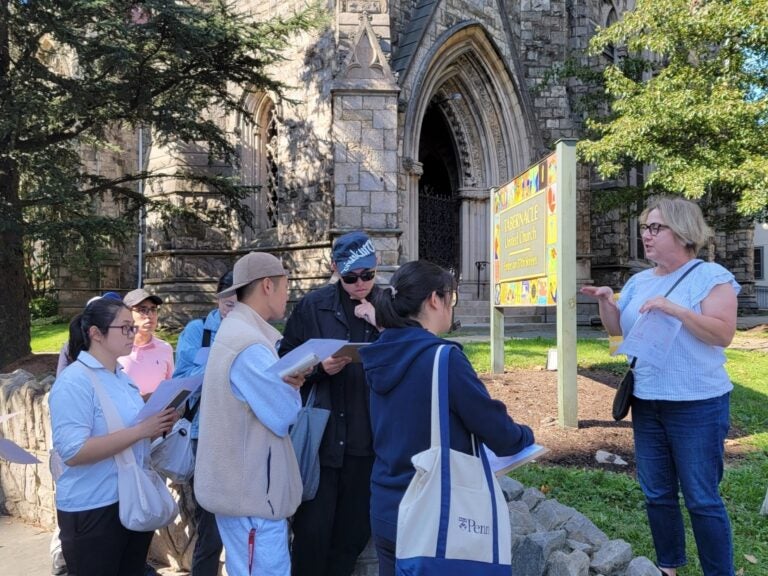
The instructors then passed Chiang’s final paper on to Amy Lambert, a preservation alum from 2016 who serves as the president of the board for the University City Historical Society (UCHS). UCHS sponsored the nomination for submittal to the Philadelphia Historical Commission, which voted unanimously to designate the property on March 15.
Ke Feng (MArch’98), senior architect in the Office of the University Architect, spoke at the Historical Commission meeting on behalf of the University. “We’re very happy and grateful for this nomination,” he said, “so we support that designation to the Philadelphia Register of Historic Places.”
Site designation is one of the fundamental tools of historic preservation at the local, state, and national levels. Nominations document the historic significance of their subject property and, if approved, can afford those properties protections going forward.
Developing historical arguments for the significance of sites is the core of the Documentation I course. In her nomination, Chiang argues that the structure merited designation because it stylistically reflects a suburban aesthetic preference during a rapidly industrializing period, and exemplifies the moment Greek Revival architecture began to turn toward the Italianate.
Further, she argues that it is emblematic of the changing social history as the area developed as a “streetcar suburb” in the late 1800s, a new urban form enabled by the burgeoning technology of the rail-born horse-drawn streetcars. Chiang combined original deed research at the City Archives with historic newspapers to craft a narrative about the people who occupied 3708 Chestnut.
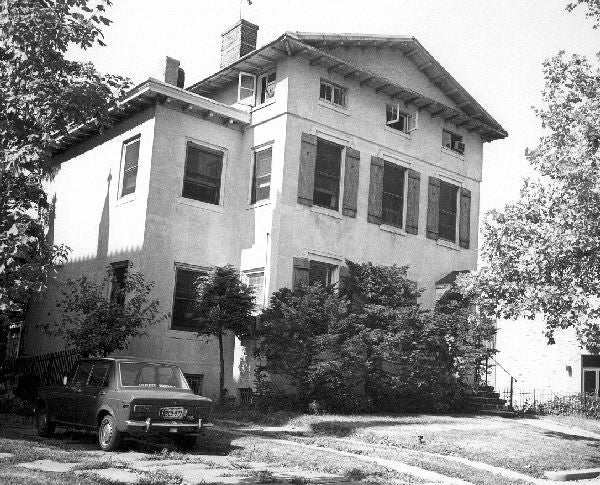
“I live on Chestnut Street, so I saw that building a lot,” Chiang remembers. “But I never thought that I could dig into the history so much and find an argument for the building. I did have fun in putting all these together.”
“Documentation I is a foundational course for all historic preservation students,” notes Ammon. “Whether they intend to focus on materials-based conservation, adaptive or new designs in historic settings, preservation planning, or the public history side of the field, our graduates will all need to know how to research the history of a building, site, or neighborhood. This course equips them with the archivally-based research skills to establish that starting point.”
Each year, course instructors select a focus neighborhood in Philadelphia. 2023 students’ properties clustered around Spruce Hill, a West Philadelphia neighborhood with the largest intact collection of Victorian architecture in the country.
In addition to the excess of historic character, the neighborhood selection was strategic in its timing: that October, Spruce Hill Civic Association (SHCA) submitted an historic district nomination for the third time in almost four decades. In July 2024, the Southeast Spruce Hill Historic District, nominated in partnership with UCHS, was designated to the local Register, safeguarding all properties within its boundaries from demolition.
Most of the other HSPV 6000 students’ properties will likely be protected under the auspices of this or a further three proposed historic districts within Spruce Hill. 3708 Chestnut is not within those boundaries and held the potential for designation based upon its individual significance. The property therefore warranted an individual nomination.
Wunsch, a former resident of Spruce Hill, knew about the neighborhood’s upcoming designation effort, which was launched in response to increased demolition and gentrification to the north.
Ammon explains, “Aaron had been keeping a running list of buildings in the area that could possibly merit designation based upon their architectural significance. As our students dug into these properties, however, they oftentimes uncovered meaningful social and cultural stories that went beyond architecture alone, demonstrating the many rich layers of history embodied in the built environment all around us.”

To illustrate the structure’s rich social history in her nomination, Chiang included an advertisement for E.B. Hubley’s art supply business. While preparing the nomination for submittal, Lambert noticed a significant name within Chiang’s detailed chain of title: Rubens H. Peale. After further digging, Lambert discovered that the Hubley family were related by marriage to the renowned artist Charles Willson Peale. Including this connection in the final document gave further meaning to the social history of the site, and demonstrates the collaborative nature of the work Chiang and UCHS did.
The quality of the nomination helped it sail through the Committee on Historic Designation, which reviews applications before they appear before the full Historical Commission, and which, Lambert notes, was composed of Wunsch’s former friends and colleagues.
As Lambert said in her remarks at March 15’s Historical Commission meeting, “It’s a wonderful reminder of the long shadow our friend Aaron Wunsch still casts in our beloved city.”
Teal Day of Action for SAAM
Penn President J. Larry Jameson joined the Penn Violence Prevention (PVP) team, University Life colleagues, and students on Locust Walk for the Teal Day of Action, a signature event of Sexual Assault Awareness Month (SAAM). Dressed in teal, the color symbolizing support for survivors, President Jameson engaged with students and staff, reaffirming the University’s commitment to fostering a campus culture rooted in consent, respect, and survivor support. The event served as a visible call to action, encouraging the Penn community to stand in solidarity against sexual violence and to learn more about the resources available through PVP.
As part of the day’s activities, students and staff distributed teal ribbons, educational materials, and pledge cards, sparking conversations about the importance of bystander intervention and survivor advocacy. President Jameson commended the efforts of PVP and University Life in creating a safer, more supportive environment for all students. His presence underscored the University’s dedication to addressing sexual violence through prevention, education, and advocacy, reinforcing the collective responsibility of the Penn community in fostering a campus free from harm.
Vice Provost Karu Kozuma Honored with 2025 APIKC Doris Michiko Ching Shattering the Glass Ceiling Award
Vice Provost for University Life Karu Kozuma was named the recipient of the 2025 APIKC Doris Michiko Ching Shattering the Glass Ceiling Award. Presented by NASPA’s Asian Pacific Islanders Knowledge Community (APIKC), the award recognizes individuals who have made a significant impact on the Asian/Pacific Islander/Desi American community and the student affairs profession through leadership, service, and scholarship.
The award, named in honor of Dr. Doris Michiko Ching, the first Asian American NASPA president, was presented during this year’s NASPA Annual Conference in New Orleans on Tuesday, March 18. Karu was recognized for his decades of commitment to student engagement, mentorship, and leadership in higher education.
With over 25 years of experience in student affairs, serving in various roles at Middlebury College, Columbia University, Amherst College, and here at Penn, Karu has been actively involved in NASPA since 2005 and previously served as the National Co-Chair for the Asian Pacific Islander Knowledge Community from 2009–2011.
NASPA’s APIKC “seeks to educate and inform NASPA members about the current issues, trends, and research facing Asian Pacific Islanders in higher education” and supports professionals and students by fostering mentorship, sharing research, and encouraging dialogue on key topics in higher education. Through this award, the organization celebrates Karu’s contributions to the field and his dedication to supporting students and colleagues.
Learn more about APIKC and this year’s other award winners here.
Congratulations to our Vice Provost on this well-deserved honor!
